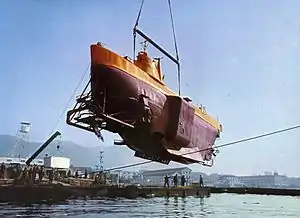Archimède
The bathyscaphe Archimède is a deep diving research submersible of the French Navy. It used 42,000 US gallons (160,000 L) of hexane as the gasoline buoyancy of its float.[1] It was designed by Pierre Willm and Georges Houot.[2] In 1964, Archimède descended into "what was then thought to be the deepest part of the Puerto Rico Trench",[3] which the NY Times reported as 27,500 feet (8,400 m).[4]
 Archimède in 1961, on launch | |
| History | |
|---|---|
| Name | Archimède |
| Namesake | Archimedes |
| Commissioned | 27 July 1961 |
| General characteristics | |
| Type | Bathyscaphe |
| Displacement | 61 tons |
Archimède was christened on 27 July 1961, at the French Navy base of Toulon. It was designed to go beyond 30,000 feet (9,100 m),[5] and displaced 61 tons.[6] In October 1961, Archimède passed its first dive tests, diving to 5,000 feet (1,500 m) unmanned.[7] On 27 November 1961, Archimède achieved a speed of 3 knots (5.6 km/h; 3.5 mph), over a distance of 4.5 miles (7.2 km) at a depth of 7,870 feet (2,400 m) in the Mediterranean Sea.[8]
On 23 May 1962, Archimède descended to 15,744 feet (4,799 m) off Honshu, Japan, in the Pacific, at the Japan Deep.[9] On 15 July 1962, Archimède descended to 31,350 feet (9,560 m) into the Kurile-Kamchatcha Trench, making it the second deepest dive ever, at that point in time, second only to the Bathyscaphe Trieste dive on the Challenger Deep.[10] On 12 August 1962, Archimède descended to 30,511 feet (9,300 m) in the Japan Deep south of Tokyo.[11]
Archimède explored the Mid-Atlantic Ridge jointly with the submarine Cyana and submersible DSV Alvin, in Project FAMOUS (French-American Mid-Ocean Undersea Study) in 1974.[12][13][14][15]
Archimède operated until the 1970s.[16] It was placed on reserve in 1975, and decommissioned in 1978.[17]
Since 2001, Archimède is on display[18] at the Cité de la Mer museum in Cherbourg.
References
- Cloud, Wallace (August 1964). "Jeeps in the Deep". Popular Science. Retrieved 11 September 2010.
- Aksyonov, Andrei & Chernov, Aleksandr Alekseevich (1979). Exploring the Deep. Collins. p. 118.
- StokstadDec. 19, Erik (19 December 2018). "'Five Deeps' mission to explore mysterious ocean trenches". Science Magazine. American Association for the Advancement of Science. Retrieved 9 June 2019.
- "DEEPEST ATLANTIC TEEMING WITH LIFE; Scientists in the Bathyscaph Surprised by Terracing in Puerto Rico Trench". The New York Times. 21 August 1964. Retrieved 9 June 2019.
- "French Bathyscaphe". Dayton Beach Morning Journal. Associated Press. 29 July 1961.
- "New French Bathyscaphe to Seek Record Ocean Deep". The New York Times. 29 July 1961.
- "French Bathyscaphe Tested". The New York Times. 30 October 1961.
- "Bathyscaphe Hits 3 Knots". Milwaukee Sentinel. Associated Press. 28 November 1961. p. 2.
- "French Bathyscaphe Dives To 15,744 Feet". Baltimore Sun. 24 May 1962. p. A2.
- "Reports Intensive Life Down At 31,350 Level Of Ocean". Dayton Beach Morning Journal. Associated Press. 16 July 1962. p. 3.
- "Bathyscaphe Archimede Descends 30511 Feet". The New York Times. Associated Press. 13 August 1962.
- Paine, Lincoln P. (2000). Ships of Discovery and Exploration. Mariner Books. p. 7.
- Sullivan, Walter (21 May 1975). "3 Craft to Dive Deep in Mid-Atlantic Valley". The New York Times.
- Information, Reed Business (7 June 1973). "A cry 'Eureka!' From the Mid-Atlantic Ridge". New Scientist. Retrieved 11 September 2010.
{{cite web}}:|first1=has generic name (help) - "F.A.M.O.U.S. (French American Mid Ocean Underwater Survey)". Encyclopaedia Universalis (in French). 2010.
- Benson, Keith R. & Rehbock, Phillip F., eds. (2002) [1993]. Oceanographic History: The Pacific and Beyond. University of Washington Press. p. 388.
- "Bathyscaphe Archimède". netmarine.net. Retrieved 11 September 2020.
- "L'Archimède: Quelques dates". ifremer.fr. Retrieved 11 September 2020.
- "Maritime Topics On Stamps : Research Submersibles". seemotive.de. Retrieved 11 September 2010.
External links
![]() Media related to Archimede (submarine, 1961) at Wikimedia Commons
Media related to Archimede (submarine, 1961) at Wikimedia Commons